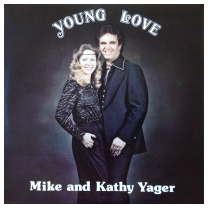 Mike & Kathy Yager "Young Love" (197--?) (LP)
Mike & Kathy Yager "Young Love" (197--?) (LP)
A hometown hero from Pentwater, Michigan, Mike Yager led a high school band in the early '60s and after serving a hitch in the Coast Guard, went back into music and got briefly signed to King Records, releasing a couple of singles in 1969. I really can't tell you much about this duo from Michigan, though I know they played at Nashville's Fan Fair in 1982... I think this is the same Mike Yager who recorded for King, but I can't say for sure. Anyone know more about this album?
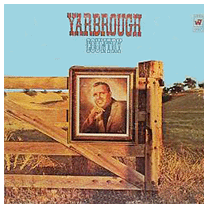 Glenn Yarbrough "Yarbrough Country" (Warner Brothers, 1969) (LP)
Glenn Yarbrough "Yarbrough Country" (Warner Brothers, 1969) (LP)
(Produced by Jimmy Bowen, Eddie Brackett & Richard Burns)
Folk-pop singer Glenn Yarbrough (1930-2016) was best known as a founding member of the Limelighters folk trio and for a solo career which included a long association with poet/pop-auteur Rod McEuen... He also dabbled in country material, at least a certain major-label version that floated around in the early countrypolitan era. The material on this album is more in a folk-pop vein, although pianist Glen D. Hardin provides the arrangements, and it seems possible that some of his TCB bandmates were involved as well. However, the album only credits the "Jimmy Bowen Orchestra and Chorus" as the musical backing... whoever that was!
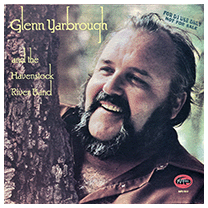 Glenn Yarbrough "...The Havenstock River Band" (Impress Records, 1971) (LP)
Glenn Yarbrough "...The Havenstock River Band" (Impress Records, 1971) (LP)
(Produced by Alex Hassilev & James Lowe)
A florid yet curiously brash folk-rock set... Yarbrough had definitely tuned in and turned on by the time this hippie-era extravaganza came out, and he's backed by a longhaired country-rock band from LA that was discovered by ex-Limelighter-turned-record-producer Alex Hassilev, who recommended them to Yarbrough. The group included guitarist/vocalists Gary Clontz and Archie Johnson, Geoffrey Pike on piano, bassist Gordon Curry, and Jeff Warren on drums -- Yarbrough worked with the Havenstock River Band for most of 1971, touring the West Coast and recording this album, which was released on Hassilev's own independent label. Hassilev also offered the band an album deal, and cut an even more rock-oriented record which got some traction before the label folded and Yarbrough went into semi-retirement. The band eventually broke up after that, with most members leaving the music business behind. However guitarist Gary Clontz toured with Glenn Yarbrough years later, as a backup musician during the late '70s and early '80s. Although most of the songs fall into the pop-folk field, there are a few twangier, more uptempo tracks, though you can definitely feel the Havenstock lads champing at the bit and yearning to cut loose. There's also a religious undercurrent to Yarbrough's music, not explicitly Christian, but definitely "spiritual," so this may be of interest to fans of hippie gospel music. Not super country-sounding, but country enough to mention here.
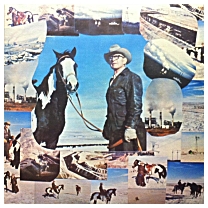 Bob Yarger "Smoke 'N' Ashes 'N' Promises" (Jester Records, 1976) (LP)
Bob Yarger "Smoke 'N' Ashes 'N' Promises" (Jester Records, 1976) (LP)
(Produced by Bob Hale)
A cattle rancher from McCone County, Montana, Bob Yarger covered a few of his favorites, but also offered up a trio of original tunes, including his satirical "Energy Independence," the title track which he also wrote, as well as Helen Waller's "Real Contentment," which extols the virtues of the rural life in Big Sky country. And, of course, there's the inevitable rendition of "Me And Bobby McGee," one of the most popular cover songs of the era. He's backed by Red Austin on bass, Jim Dressler (drums), Grace Fillmore (drums), Bob Hale (rhythm guitar), Fred Halls (bass), Alan Meade (steel guitar), Jimmy Nichols (lead guitar), and Danny Tryan (drums).
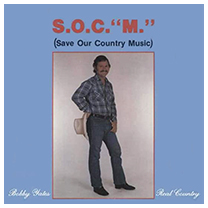 Bobby Yates "S.O.C.M. (Save Our Country Music)" (Rave Records, 1986-?) (LP)
Bobby Yates "S.O.C.M. (Save Our Country Music)" (Rave Records, 1986-?) (LP)
(Produced by Ray Edenton)
Florida-born neotrad honkytonker Bobby Yates alternates his own robust originals with a handful of Hank Williams classics... He's backed by members of Hank's old band, the Drifting Cowboys -- Don Helms and Jerry Rivers -- along with Ray Edenton, a couple of Edenton's family members, and several Nashville A-Teamers, such as Hargus Robbins, Kenny Malone and Charlie McCoy.
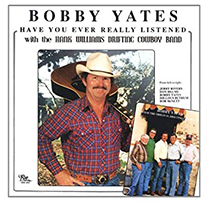 Bobby Yates "Have You Ever Really Listened (To A Hank Williams Song)?" (Lucky Lady Records, 1989) (LP)
Bobby Yates "Have You Ever Really Listened (To A Hank Williams Song)?" (Lucky Lady Records, 1989) (LP)
(Produced by Ray Edenton)
More Hank-alicious hard country from this Punta Gorda, Florida honkytonker. Yates, whose day job was as a land surveyor in the Florida Everglades, is backed by the same crew of Drifting Cowboys alums: Don Helms, and Jerry Rivers, as well as old-timer Bob McNett and several A-list Nashville studio cats. This album is a collection of singles recorded at Young'Uns Studio in Nashville and previously released between 1985-87 on various NSD labels. Lucky Lady seems to have been an offshoot of the German collector label, Binge Discs, which specializes in classic hard-country, both vintage and new.
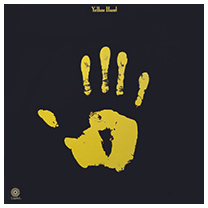 Yellow Hand "Yellow Hand" (Capitol Records, 1970) (LP)
Yellow Hand "Yellow Hand" (Capitol Records, 1970) (LP)
(Produced by Dallas Smith)
After the fabled hippie supergroup Buffalo Springfield imploded, some clever record execs found a way to recycle a few songs left over from the uncut sessions-that-might-have-been. This hastily-conceived studio band got to record six unused offerings by Stephen Stills and Neil Young, and fans of early country-rock might find the familiar, airy harmonies and folk-soul arrangements comforting. The remainder of the tracks are credited to Jerry Tawney, who moved through a string of little-known bands in the late 'Sixites and early 'Seventies. Perhaps the most notable member of the group was teenaged guitarist Pat Flynn, who later co-founded the pioneering acoustic group, New Grass Revival, which helped open up bluegrass music to the hip and happening new, rock-friendly sounds of the era. This wasn't a game-changing record, but it fits nicely into the whole Poco/Eagles/Ozark Mountain Daredevils side of things.
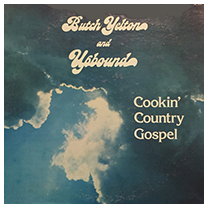 Butch Yelton & Upbound "Cookin' Country Gospel" (1976-?) (LP)
Butch Yelton & Upbound "Cookin' Country Gospel" (1976-?) (LP)
(Produced by Butch Yelton)
A hard-driving gospel twang band from Bardolph, Illinois... This album features five songs written by bandleader Butch Yelton, as well as one by singer Mary Foley, along with a track called "Amazing Grace, No. 3" written by pedal steel player Danny Weaver... They also include covers of Andre Crouch and Gary S. Paxton, as well as a version of Tom T. Hall's sweet and sappy "I Love." Yelton's true claim to fame, though, came with his album below, which for better or for worse has been seized upon by the irony police, those oh-so-dedicated would-be hipsters who fill their blogs with snarky posts of so-called "bad" album covers. Sigh.
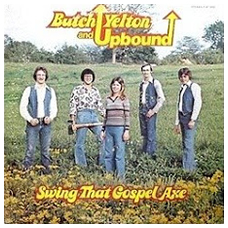 Butch Yelton & Upbound "Swing That Gospel Axe" (19--?) (LP)
Butch Yelton & Upbound "Swing That Gospel Axe" (19--?) (LP)
For some reason, the sub-breed of hipster bloggers who like to post pictures of "bad" album covers have seized upon this album as one of their ultimate holy grails... Yes, it's a little dopey -- the cover shows the fairly clean-cut, not-that-weird-looking Upbound band standing in a pasture, with singer Butch Yelton holding a axe in his hands, as a visual cue for the metaphoric weapon of prayer in the album's title song. Whatever. Some people are Christians; some of these people also like and/or play country music. Get over it. Personally, I think that mocking people you consider hicks or muggles -- or even just people (gasp!) dressed in fashion styles from decades ago -- is a boorish, intellectually empty pastime. It reveals more about the mockers than the mocked. (Like, for example, that most of you snotty city slickers have never chopped any wood? Just saying.) I haven't heard this album yet, but I do look forward to checking it out some day. And when I do, I'll let y'all know what I think about it, without resorting to facile irony or sarcasm.
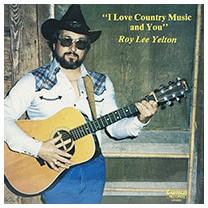 Roy Lee Yelton "I Love Country Music And You" (Lamon Records, 1983) (LP)
Roy Lee Yelton "I Love Country Music And You" (Lamon Records, 1983) (LP)
(Produced by David Floyd, Carlton Moody & David Moody)
Aw, shucks, Roy... you're making me blush! Well, I'm not totally sure what's going on with this album, but it seems to be sort of a song-poem set, with all the songs written by a middle-aged guy named Bobby R. Bush. The singer, Roy Lee Yelton, appears to have been a North Carolinian, though I'm not sure if he played many local shows. On this album he's basically backed by Carlton Moody and his NC studio band, including pianist Don Ange, David Bostic (steel guitar), Steve Hicks (harmonica), Carlton Moody (dobro and guitar), David Moody (drums), Dwight Moody (fiddle), Trent Moody (bass), and Don Radford on lead guitar.
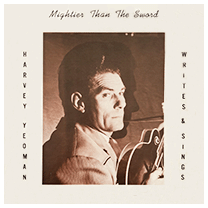 Harvey Yeoman "Mightier Than The Sword" (19--?) (LP)
Harvey Yeoman "Mightier Than The Sword" (19--?) (LP)
A super-twangy, absolutely wonderful, real-deal bedrock country gospel set from mandolin picker, singer and songwriter James Harvey Yeoman (1926-2009), longtime member of the San Joaquin Valley's Christian Troubadours. This "solo" album features several of his usual bandmates, including bass player Bill Carter, Frank Petty, Philip Price (banjo and guitar) and Wayne Walters (guitar), providing solid, unflashy accompaniment on a set dominated by original material, with all but two tracks credited to Mr. Yeoman. It's great stuff, pure acoustic hillbilly twang, defined by Mr. Yeoman's rough-cut, resolutely rural vocals, which heavily echo the tone of Bakersfield icon Buck Owens, with a bit of Hank Snow's plainspoken monotone in the mix. Born in Hartford, Arkansas, Harvey Yeoman was the son of a Pentecostal preacher, and took up the mantle himself as a Pentecostal minister and evangelical musician; the contours of his career are a little fuzzy, but he seems to have been a member of the Troubadours when it was in Southern California, and moved to Tennessee when bandleader Wayne Walters set up shop in Nashville in the mid-1960s. It's not clear where or when this album was made, though it has a distinctly West Coast vibe, particularly when Yeoman leans into his Buck Owens-style vocals. Probably of 1970s vintage.
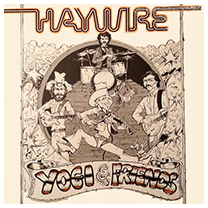 Yogi & Friends "Haywire" (1982-?) (LP)
Yogi & Friends "Haywire" (1982-?) (LP)
(Produced by Yogi Klos & Norbert Dupasquier)
Canadian fiddler Ihor ("Yogi") Klos (1944-2013) fronted this four-piece band, working through fiddle classics such as "Orange Blossom Special" and Charlie Daniels' "The Devil Went Down To Georgia," along with oldies like "Smoke, Smoke, Smoke That Cigarette" and "Tennessee Waltz." Of particular interest is a non-country number that rounds things out, "Ukranian Medley" which doubtless gives us a clue to Klos' family background, as well as bassist John Nekrep's, although Yogi himself was born in Austria, and grew up in Manitoba. This album was recorded at Maddock Studios, in West Saint Paul, and captures one of several bands that Klos performed with... he tried working in Nashville for a while, but found the Canadian vibe more congenial, and established himself as a regional and national artist, playing both country and Eastern European music.
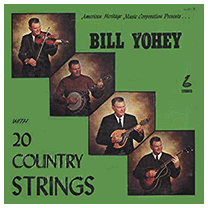 Bill Yohey "Bill Yohey With Twenty Country Strings" (American Heritage Music Corporation, 197--?) (LP)
Bill Yohey "Bill Yohey With Twenty Country Strings" (American Heritage Music Corporation, 197--?) (LP)
Banjo picker and multi-instrumentalist William Russell Yohey (1919-1991) was a stalwart presence on the upper plains and Pacific Northwest old-timey roots music scene, participating in numerous fiddling contests and whatnot, also recording as a solo artist and contributing tracks to several festival albums. Born in Nebraska, he later moved to McMinnville, Oregon and became a notable member of the Oregon Old Time Fiddlers Association, dating back at least as far as the early 1960s. Mr. Yohey played banjo, fiddle, guitar and mandolin, all of which are showcased on this album (with the total number of pluckable, strummable or bowable strings adding up to twenty!) It's actually a pretty nice record, with Mr. Yohey switching the lead instruments from track to track -- beautifully engineered, and soulfully performed. I'm not that big on all-instrumental albums, but this one was quite pleasant.
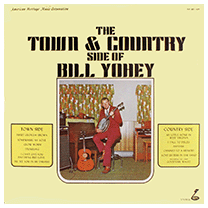 Bill Yohey "The Town And Country Side Of Bill Yohey" (American Heritage Music Corporation, 197--?) (LP)
Bill Yohey "The Town And Country Side Of Bill Yohey" (American Heritage Music Corporation, 197--?) (LP)
On this album he showcases on side of "town" music -- pop standards such as "Glow Worm," "I Can't Give You Anything But Love," "Sweet Georgia Brown" -- and one side of "country" material like "Anytime," "I Fall To Pieces" and "Love Letters In The Sand." One track, "Goodtime Waltz," was his own composition.
 Buddy York "You Don't Meet Many Old Cowboys" (Silver Dollar Records, 1976) (LP)
Buddy York "You Don't Meet Many Old Cowboys" (Silver Dollar Records, 1976) (LP)
 Rusty York & J. D. Jarvis "Blue Grass Gospel Songs" (Rural Rhythm Records, 1968) (LP)
Rusty York & J. D. Jarvis "Blue Grass Gospel Songs" (Rural Rhythm Records, 1968) (LP)
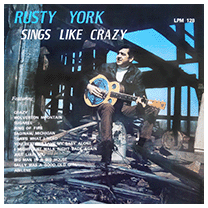 Rusty York "Sings Like Crazy" (Jewel Records, 1968) (LP)
Rusty York "Sings Like Crazy" (Jewel Records, 1968) (LP)
This album features a ton of country covers, about half of them Harlan Howard songs... It also includes one Rusty York original, "I Might Just Walk Right Back Again," which was co-written with Bobby Bare. Hillbilly old-timer Jimmie Skinner signed the liner notes, which go into great detail about York's career -- including a list of venues that Rusty York played at, from state fairs and the Grand Ole Opry, to European tours and gigs in Vegas. Sadly, though, there's no info on the musicians providing backup, or even who produced the sessions. We can certainly guess, but will probably never know.
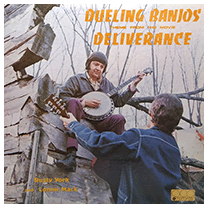 Rusty York & Lonnie Mack "Dueling Banjos: Theme From The Movie Deliverance" (QCA Records, 1973) (LP)
Rusty York & Lonnie Mack "Dueling Banjos: Theme From The Movie Deliverance" (QCA Records, 1973) (LP)
Sweet. Obviously they were capitalizing on the popularity of the hillbilly defamation classic, Deliverance, but despite that classic film's questionable social messaging, it's hard to complain about the chance to hear Rusty York jamming with twang-bar king Lonnie Mack... Also on board is fiddler Junior Bennett, who worked as one of York's key collaborators at the Jewel Studios in Cincinnati.
 Rusty York "Rock And Roll Memories" (Jewel Records, 1979) (LP)
Rusty York "Rock And Roll Memories" (Jewel Records, 1979) (LP)
A handy compilation of York's old rock'n'roll recordings from 1956-65... Admittedly, these aren't the hottest rock and rockabilly tracks ever, but they still deliver plenty of good, clean-cut fun. The young Rusty York exuded kind of a Ricky Nelson vibe -- definitely in touch with the happening now sounds, but a little on the controlled side, particularly in his vocals in in the overall sonic sculpture of the tunes. On the other hand, there are some surprisingly dense, complex, explosive pop riffs and you can get a sense of how he learned to handle himself in the studio. Plenty of covers of well-known hits though not much straight-up country... I have a pre-digital-era LP that's pretty nice, though I suppose it has been since supplanted by fancier reissues in the intervening decades.
 Rusty York "The Cincinnati Fireball" (Gee Dee Music, 1994) (CD)
Rusty York "The Cincinnati Fireball" (Gee Dee Music, 1994) (CD)
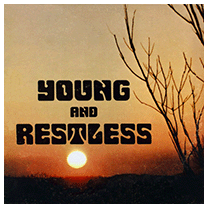 Young And Restless "Young And Restless" (Woodnote Records, 1981) (LP)
Young And Restless "Young And Restless" (Woodnote Records, 1981) (LP)
(Produced by Ron Dabbs & Rande Ferguson)
This band from Omaha, Nebraska kicks off their album with a tune called "Bedroom Eyes (And Bar Room Lies)" and then they're off to the races. The group included Pam Cline (lead guitar), Mary Howard (bass), Pat Minikus (percussion), Diana Sapp (keyboards) and Gary Sapp on guitar, with all the band members singing lead on a tune or two. Mary Howard (later Mary Link) and Diana Sapp (later Diana Van Moorleghem) continued to work together for many years to come, notably in a band called The Links, with Mrs. Link's husband Jimmy.
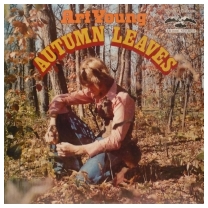 Art Young "Autumn Leaves" (Eagle Records, 1977) (LP)
Art Young "Autumn Leaves" (Eagle Records, 1977) (LP)
(Produced by Jack Clements)
A longtime fixture on Winnipeg, Canada's country scene, singer Art Young started his career as a child performer in the vaudeville circuit as part of a sibling band called the Young Trio, along with his brother and sister. Somewhere along the line he got into country music, and by the 1960s was playing with a group called the Country Gems, which also featured steel player Wayne Link, Elmer Nault on lead guitar, and Ken Flamand on bass. This album came out years and years later, and features a wealth of original material, including a couple of regional pride songs ("Manitoba In The Fall" and "Girl From Saskatoon") a few cover songs, and an homage to the Man In Black, called, simply "Johnny Cash."
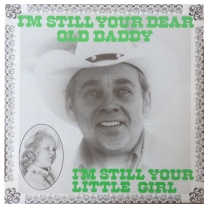 Art Young "I'm Still Your Dear Old Daddy" (Downs Record Company, 19--?) (LP)
Art Young "I'm Still Your Dear Old Daddy" (Downs Record Company, 19--?) (LP)
(Produced by Jack Clements)
A delightfully unpretentious album featuring a now- middle-aged Art Young on a short-lived label from Winnipeg, just singing plain-old country music, no muss, no fuss. He has a modest voice, nothing to write home about, but he uses it well, crooning out one understated country tune after another. Likewise, the arrangements are simple and to the point, with clean, satisfying pedal steel riffs by Al Gain and Ron Halldorson, matched to equally straightforward backing by the rest of the band. A lot of original material, with five songs written by Art Young, including the title track, which is an homage to his daughter Cori, who sings along on the chorus, ala Conway Twitty and Joni Lee. This is a nice record. Not earth-shattering, but consistently pleasant and completely sincere. Recommended!
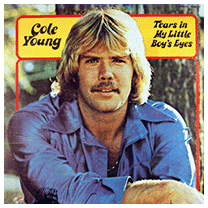 Cole Young "Tears In My Little Boy's Eyes" (Younger Records, 1980-?) (LP)
Cole Young "Tears In My Little Boy's Eyes" (Younger Records, 1980-?) (LP)
(Produced by Glen Fox, Marshall Sandene & Cole Young)
An album of all-original material, all of it written by singer Cole Young, whose origins and career path are largely unknown. In addition to singing and composing the songs, Mr. Young played piano and rhythm guitar, with backing from Don Giannico (bass), Larry McGrath (lead guitar), Mike McGrath (drums), and perhaps most intriguing, backing vocals from singer Jody Troutman, who is best remembered as a longtime member of the Ozark Mountain Daredevils entourage. No idea where Cole Young was from, though the credits tell us the album was mastered at Randy's Roost in Nashville; there does seem to be a Missouri connection, as one of the producers ran a studio in Willow Springs, MO., though Mr. Cole could have been from anywhere, really.
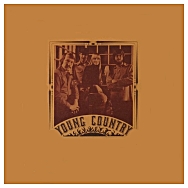 Young Country "Young Country" (USR Records, 1975) (LP)
Young Country "Young Country" (USR Records, 1975) (LP)
(Produced by Larry Wallace & Young Country)
This album was a souvenir of a Dallas, Texas folk-country band that featured singer Randy Brooks, who is probably best remembered as the guy who wrote the novelty classic, "Grandma Got Run Over By A Reindeer." That song, which is not included here, became a fixture of the Young Country act after Brooks wrote the lyrics in 1977... Of course, it also became a national hit after Elmo Shropshire (of Elmo & Patsy fame) heard them play it at a lounge gig up in Lake Tahoe... I'm not sure if the Young Country band ever recorded "Grandma" themselves -- this album may have been their only release. It mostly includes covers of then-current singer-songwriter/outlaw/folk-country songs such as Paul Craft's "Midnight Flyer," "Think About The Mountains" by Steve Fromholz, "Geronimo's Cadillac" and a couple of other songs by Michael Martin Murphey, along with oldies like Hank Williams' "I Saw The Light" and "Silver Threads And Golden Needles," as well as a mandolin-led cover of "I Don't Know How To Love Him," featuring Ronstadt-ish vocals by bandmember Cheryl Sparks. The only original song on here is a good novelty number by Randy Brooks, "Will You Be Ready At The Plate When Jesus Throws The Ball?" Even though it's mostly cover tunes, this is a pretty strong album by a better-than-average country lounge band... The production values are modest, but the musicianship is pretty high. Worth a spin, for sure. (Side note: While working in Reno in '73, Young Country's husband-wife duo of Rick Sparks and Cheryl Sparks tried forming a new group with some other Texans who were doing shows at the same club. While they ultimately stuck with their original band (and recorded this album), the new group, Rosewood Junction, cut an album around the same time.)
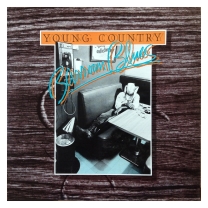 Young Country "Barroom Blues" (Lost Records, 1978) (LP)
Young Country "Barroom Blues" (Lost Records, 1978) (LP)
(Produced by Keith Brown & Young Country)
An entirely different group from the Dallas, Texas band listed above, this Nebraska-based country-rock combo had its heyday from 1975-82, playing throughout the Midwest... I think this was their only album, but it's definitely a good one! Packed with clearly-conceived, concisely written, well-performed country tunes, this is an amiable, unpretentious set with several strong tracks and a ton of original material written by Jim Casey and Nick Leland (and one cover of a Merle Haggard song...) Highlights include Leland's "Married To The Bottle" and Casey's "Color TV," in which the sing admits that he mostly likes his girlfriend because of her swell home entertainment system. The picking is generally first-rate, bright and twangy, and at times pleasantly plunky... Even on the slower songs, like "Wait For Yesterday," they come up with some interesting tonalities during the bridge, so even the album's weaker moments are okay. Overall, this one's definitely worth tracking down. Apparently, not long after they made this record the band broke up, then regrouped in 1980 as "The Y.C. Critter Band," and played regionally for a couple more years until they finally gave up the ghost. This LP's a nice legacy, though!
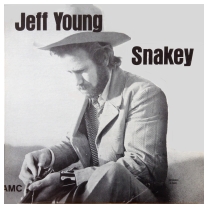 Jeff Young "Snakey" (AMC Records, 1974) (LP)
Jeff Young "Snakey" (AMC Records, 1974) (LP)
(Produced by Jeff Young)
An excellent set of independently produced, musically relaxed, poetically-minded honkytonk music, very much styled after Merle Haggard's brand of twang. There's no info about where this was recorded, although I think it may have been a West Coast affair, either somewhere in California or maybe the Pacific Northwest, like Spokane. (Anybody out there know for sure?) Regardless, this is a very good album -- if you're looking for hippiebilly artists who really "got" country music, this record should really be on your short-list. All the songs are originals, and Young takes the style seriously. Among the musicians listed are guitarist-producer Gene Breeden and a steel player named "Speedy" Price (although I'm not sure if it's Vernon "Speedy" Price from Seattle, or Herb "Speedy" Price, who was session picker in Nashville... Again, if anyone out there has more info they'd like to share, I'm all ears...)
Jesse Colin Young (and The Youngbloods) -- see artist profile
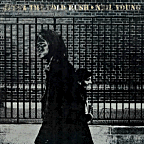 Neil Young "After The Gold Rush" (Reprise Records, 1970) (LP)
Neil Young "After The Gold Rush" (Reprise Records, 1970) (LP)
(Produced by Neil Young, David Briggs & Kendall Pacios)
A landmark hippie rock record, this album has a distinctive, acoustic-based folk and country feel... Heck, he even covers Don Gibson's "Oh, Lonesome Me," brilliantly transforming the bouncy country classic into a mopey, opiated dirge. There's a little bit of the grating electric rock that he's also known for, but for the most part this is a mellow masterpiece, one of those wonderful records that always seem too short, though perfect for playing over and over again. One of my all-time faves, in any genre.
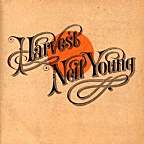 Neil Young "Harvest" (Reprise Records, 1972)
Neil Young "Harvest" (Reprise Records, 1972)
(Produced by Neil Young, Elliot Mazer, Henry Lewy & Jack Nitzsche)
Led by the smash pop hit, "Heart Of Gold," this acoustic-based classic cemented Neil Young's place in the '70s pop firmament and helped define the country-rock genre. A sweet, mellow album -- includes the evocative "Out On The Weekend," the retro-sexist "A Man Needs A Maid," the politically-charged "Alabama" (appreciated at the time; a bit of a drag now...) and one of my favorite of his songs, the irresistible "Old Man," in which the hippies confront their own mortality and (worse still!) middle-age. Great record.
 Neil Young "Harvest Moon" (Reprise Records, 1992)
Neil Young "Harvest Moon" (Reprise Records, 1992)
(Produced by Neil Young & Ben Keith)
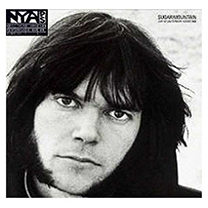 Neil Young "Sugar Mountain: Live At Canterbury House 1968" (Reprise Records, 2008)
Neil Young "Sugar Mountain: Live At Canterbury House 1968" (Reprise Records, 2008)
Legions of Neil Young fans will rejoice at the legit, major-label release of these live, folk-club recordings from 1968, when Young was just escaping the orbit of the Buffalo Springfield band, but clearly headed for greater things. It's an intimate set, with great sound quality. There are several classics, performed in crisp acoustic versions -- "Mr. Soul," "Broken Arrow," "The Loner," "Birds" -- and lots of discursive, offhand stage banter (listed in the parlance of the times as "raps" on the album, and thoughtfully sorted out in the mix as separate tracks, so you can just hear the music, if that's your preference...) Highlights include "Sugar Mountain" and "Birds," but it's the whole snapshot-of-the-artist angle that's the real attraction here, with Young laughing at his own jokes, forging an intimacy with his rapt, receptive audience, sharing his then-current bag of tricks. It's pretty groovy, and a nice look at his early career...
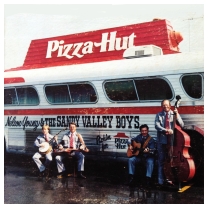 Nelson Young & The Sandy Valley Boys "Pickin' For Pizza" (Eagle Records, 1980) (LP)
Nelson Young & The Sandy Valley Boys "Pickin' For Pizza" (Eagle Records, 1980) (LP)
(Produced by Leonard B. Needham)
Hey man, a job is a job. I mean, you gotta love this: how many times have you heard someone tell that story about seeing some great band playing a crappy gig at a pizza parlor? Well, bluegrass bandleader Nelson Young not only played at pizza parlors, he wrote a song about it, got official sponsorship from Pizza Hut (which included painting their red-roof logo on his tour bus) and made an album to document the phenomenon. The best part is that the opening track, "Pickin' For Pizza," really is about the Pizza Hut gig, and mentions the restaurant chain by name, literally singing its praises amid a brisk, bouncy musical backing. It's also nice that this really was a good band, playing in a bright, melodic style reminiscent of Flatt & Scruggs and Jimmy Martin, with particularly strong dobro and banjo picking. Dunno if any of these guys went on to play in other bands, but this is a good bluegrass record. (By the way, my pizza parlor brag-band was Green Day, who I saw play at LoCoCo's or some place like that, a bazillion years ago at some strip mall in Berkeley... So there! Neener, neener, neener.)
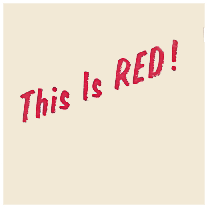 Red Young "This Is Red!" (Red Young Enterprises, 1981)
Red Young "This Is Red!" (Red Young Enterprises, 1981)
(Produced by DeWayne Orender & Don Powell)
A nice set of rootsy though commercially-oriented country with a late-'70s neotrad sound similar to that of Top 40 artists such as Ed Bruce, Mickey Gilley and Red Steagall. Highlights include the weeper, "You're Treating Me Like Company" and the boozy "Here's A Toast To The Record (On The Jukebox)" along with other pedal-steel drenched twang tunes. Country crooner Red Young was apparently a Midwesterner who was based in Independence, Missouri when this record came out, although he may have originally been from Wichita. He traveled to Nashville to cut this album, backed by studio pros who included Mark Casstevens and Weldon Myrick, with Lamar Morris playing lead guitar. It's fairly solid honky tonk material, with most of the songs credited to DeWayne Orender and Lamar Morris, who were signed to Acuff-Rose publishing -- Morris played guitar on the recording sessions, while Orender was a co-producer. It's not the most vigorous album ever, but it's as good as a lot of major-label releases from the same era... Obviously, it went nowhere, since there seems to be no trace of Red Young (or this record) anywhere online, though honestly he could have -- and maybe should have -- become a real star.
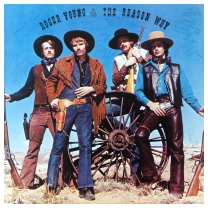 Roger Young "...And The Reason Why" (Reason Why Records, 1969) (LP)
Roger Young "...And The Reason Why" (Reason Why Records, 1969) (LP)
(Produced by Bob Sullivan)
Bandleader Roger Young (1946-2010) lived all over the Southwest and Panhandle regions -- born in Yuma, Arizona, he grew up in Oklahoma and Texas, ping-ponging all over the region throughout his life, first with his family and then with various bands. He started his professional career in the mid-1960s while he was still in highschool in Midland, Texas and led several different bands, though his best-known group was the Reason Why, which was named after a song he released as a single a few years before. Although this album looks like it would be the ultimate country-rock hippiebilly set, with the band decked out in fringe-leather spaghetti western duds, it's actually a pretty straightforward set of folk-country/countrypolitan style music, with solid but understated backing by a Dallas, Texas studio crew that included superpicker Phil Baugh on dobro and guitar, Maurice Anderson on steel, old-timer Smokey Montgomery providing arrangements and Mickey Raphael on harmonica, several years before he hooked up with Willie Nelson. Roger Young had a fairly thin, unusual voice, cut from the same cloth as fellas like Bill Anderson or Dick Feller... He keeps things simple and sings his songs without much fuss or bother, but gets the lyrics to resonate nonetheless. All in all, a pretty groovy record and certainly worth tracking down, particularly if you're interested in the intersection of Nashville pop and outlaw twang.
Steve Young -- see artist profile
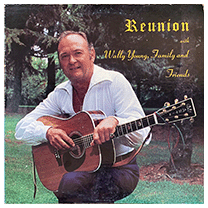 Wally Young "Reunion" (Reunion Records, 19--?) (LP)
Wally Young "Reunion" (Reunion Records, 19--?) (LP)
(Produced by Ron Compton, Louis Hone & Mark Kennedy)
Originally from Pointe Au Chene, Quebec, Wally Young emigrated from Canada to San Diego way back in 1960, where he fit in with the Southern California old-school country scene. He formed a band called Buck Wayne & The Buckshots, and performed frequently at the Bostonia Ballroom, which was run by hillbilly boogie/western swing old-timer Smokey Rogers. Young was already a country music veteran from his early years in Canada, where he and his brothers Bazil and Floyd formed a band that toured widely and cut a few discs for Rodeo Records. He returned to Montreal to record part of this album with his brothers, while the remaining sessions were taped in El Cajon, CA, with a different band. Musicians include Serge Bougie (drums), Ronnie Cavanagh (steel guitar), Roger Coomes (drums), Tom Dolymak (steel guitar), Mark Kennedy (lead and rhythm guitar), Bazil Young (rhythm guitar), Maureen Young (piano and vocals), and Joel Zifkin on fiddle... And of course Wally Young on lead vocals and guitar. The songs are almost all Wally Young's originals, including a new version of his song, "Tomorrow I'll Be Gone," a tune he and his brothers first recorded back in Canada, many years before. No date on this disc, though it looks like something from the early 1980s, or possibly late 'Seventies.
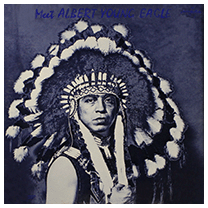 Albert Young Eagle "Meet Albert Young Eagle" (Little Richie Records, 1977-?) (LP)
Albert Young Eagle "Meet Albert Young Eagle" (Little Richie Records, 1977-?) (LP)
Surprisingly little information about this fellow online, though the back cover liner notes provide a pretty concise outline of his biography. According to this album Albert Young Eagle was apparently of Navajo descent, born in Gallup, New Mexico in 1953 and mostly raised on a nearby reservation located next to the El Morro National Monument. His father owned a nightclub called the Rendezvous Bar, and as a teenager Albert was in a rock band called the Teardrops for several years before he joined the military. He switched to country music after he came back home to Gallup, and was in the orbit of Southwestern music mogul Little Richie Johnson for most of his career, traveling to Nashville to record with Charlie McCoy and his A-list crew, most likely on Little Richie's dime. One missing piece of the puzzle is whether he was actually Albert Lucero, the name given on the composer of one of his songs, "It's All Over Now," which was released as a single and also appears on this album. The Bakers Patch music blog says yes, though the copyright filing with the Library Of Congress listed Lucero and Young Eagle separately. However, the composer credit on this album gives Albert Young Eagle as the author, which gets me to about 99% certainty that his birth name was Lucero, particularly since the trail grows cold on the Young Eagle name, outside of the handful of records produced in the late '70s. The rest of his biography remains obscure: Albert Young Eagle was elected into the Colorado Country Music Hall Of Fame in 1979, so it's possible he moved to the Centennial State sometime after this album came out. There obituaries for several Albert Luceros who lived in several different states -- Arizona, Colorado, etc. -- but I was unable to link any of them to this artist. Unless I hear otherwise, though, I'll accept Mr. Lucero's assertion that he was a First Nations country singer and add him to the list.
 Albert Young Eagle "The Best Of Albert Young Eagle" (Little Richie Records, 1979-?) (LP)
Albert Young Eagle "The Best Of Albert Young Eagle" (Little Richie Records, 1979-?) (LP)
An odd album title, particularly as none of the tracks on Young Eagle's first album are included... Partly drawing on some late-'Seventies singles, this is mostly a set of cover tunes, mainly brand-name country classics such as "Faded Love," "Green Green Grass Of Home," "Statue Of A Fool" and "Help Me Make It Through The Night," et.al., though there are also three songs provided by Little Richie Johnson's publishing company: "Have A Talk With Your Conscience," "On My Way To Houston," and "Unwritten, Unsung Country Love Song," though all three were also recorded by other Little Richie artists.
Dwayne Youngblood "...Salutes The Bicentennial: 1776-1976" (1976) (LP)
Fiddler C. Dwayne Youngblood (1935-2002) was originally from Idaho, but lived in Visalia, California during the 1970s, and trekked over to Bakersfield to record this instrumental set at the Buck Owens Studios. Mr. Youngblood was a devoted old-timey artist who competed in countless championships across the country, dating back to the early 1960s and contributed a version of "Jack Of Diamonds" to a compilation album called Fiddle Jam Session, that came out of these mid-'60s sessions. Although this solo album was pitched as a Bicentennial celebration, it includes no overtly patriotic material -- instead, it's mostly classic hoedown tunes like "Billy In The Low Ground" and "Blackberry Blossom," as well as an original composition, "Shirley's Waltz," which was written for his wife. Youngblood's son Rick accompanies him on guitar, and he plays some fiddle as well; Rick Youngblood went on to become a championship fiddler and attended the annual National Old Time Fiddle Contest forty-eight straight years in his lifetime. This album came out around the same time that Dwayne Youngblood won the California state fiddling championship in 1977. The Youngbloods also appeared on an album with Jim Carley, a banjo picker from Boise, Idaho.
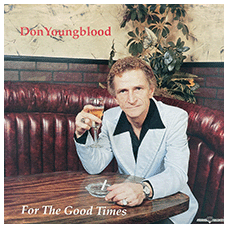 Don Youngblood "For The Good Times" (Jewel Records, 19--?) (LP)
Don Youngblood "For The Good Times" (Jewel Records, 19--?) (LP)
(Produced by Junior Bennett, Clarence Riffe & Rusty York)
Piano plunker Don Youngblood was a hometown hero from Madison, Indiana who cut several singles and over a dozen albums, dating back to the early 1960s, right up through the the early 2000s. A devotee of Jerry Lee Lewis, Youngblood was a piano-thumping rowdy with deep country roots. He cut his first single back in 1964 while still working at a factory in Charlestown, and went on to cut over a dozen albums while touring regionally in Indiana, Kentucky and Ohio. He's backed here by some of the guys in the house band at the Cincinnati-based Jewel label, including fiddler Junior Bennett, Eddie Drake (lead guitar), Kenny Holycross (pedal steel), Reggie Wallace (rhythm guitar) and -- in a nod to his rock'n'roll roots, Tim McCord on saxophone.
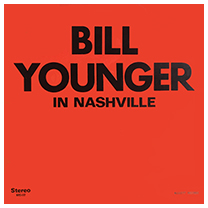 Bill Younger "In Nashville" (Nugget Records, 19--?) (LP)
Bill Younger "In Nashville" (Nugget Records, 19--?) (LP)
(Produced by Gene Rice & Mark Tulbert)
A nice, humble little record featuring plainspoken (and thoroughly charming) vocals by the uber-obscure Mr. Younger. Backing him on nimble but not overshadowing guitar is session legend Fred Carter, Jr., who purchased the Nugget label in 1968, intending to build it from an indie into a major label, although apparently he got sidelined by running it as a custom/vanity press company. Although the album title suggests a slick, modern style, this record was a real throwback to the hillbilly stylings of the 1940s and early '50s, with simple ditties and modest novelty songs that would have been staples for artists such as Wilf Carter or Kenny Roberts back in that bygone era. Younger is not a powerful singer, but he is earnest and persuasive, and there's a lot to like in his old-fashioned repertoire. I haven't pinned down the year this one came out, but it had to have been between '68 and 1975, when Carter folded up the Nugget label, liquidating the whole business the following year.
 The Younger Brothers Band "The Younger Brothers Band" (Montagne Records, 1979) (LP)
The Younger Brothers Band "The Younger Brothers Band" (Montagne Records, 1979) (LP)
This group from Lancaster, Pennsylvania grew out of a mid-1960s highschool garage band called the Velaires, which featured guitarist Denny Sweigart and Terry Gehman on keyboards. They eventually moved from rock into country, forming the Younger Brothers Band in the '70s, and playing steady gigs for several years while Gehman and Sweigart held down day jobs as the visual arts instructor and music teacher (respectively) at the same local high school. In addition to several LPs, they also released a number of singles before disbanding towards the end of the '80s.
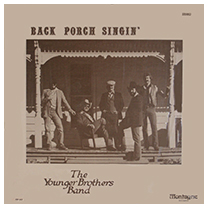 The Younger Brothers Band "Back Porch Singin' " (Fantastik Records, 1981) (LP)
The Younger Brothers Band "Back Porch Singin' " (Fantastik Records, 1981) (LP)
(Produced by The Younger Brothers Band)
This edition of the band included Terry Gehman, Don Hall, pedal steel by George Rowe, Hoagy Strother and Denny Swiegert, playing a lot of original material, as wella s an affectional rendition of "Eastbound And Down.
The Younger Brothers Band "The Younger Brothers Band" (HME Records, 1985) (LP)
 Dale Youngs & The Country Rebels "Walking Down An Old Country Road" (Round Robin, 1978) (LP)
Dale Youngs & The Country Rebels "Walking Down An Old Country Road" (Round Robin, 1978) (LP)
(Produced by Roy Drusky & Jim Pierce)
Dale Youngs was an East Coast, rust-belt country singer, born in New York state with roots in Pennsylvania, who made his way to Nashville where he landed a gig in Roy Drusky's band, circa 1975-78. He played on the Opry and recorded this album with Drusky's help around the same time. Drusky may have helped with the repertoire as well, notably showcasing a trio of previously-recorded Eddie Rabbit songs -- "Pure Love" (a hit for Ronnie Milsap in '74), "Do You Right Tonight" and "Hearts On Fire" (a #2 hit for Rabbit in '77) -- a nod to Rabbit's early years as a Nashville songwriter, when Drusky was one of the first artists to record his work. Curiously, Youngs also does a gender-flipped version of a classic western novelty oldie, sung here as "I Want To Be A Cowgirl's Sweetheart, along with covers such as Ray Price's "Burning Memories" and Marty Robbins' "You Gave Me A Mountain." I don't know the details, but Youngs died at age 32 (1951-1984) and as far as I know, this was his only album.
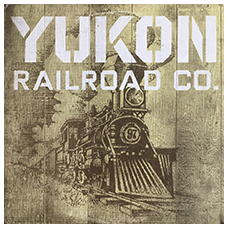 Yukon Railroad Co. "Yukon Railroad Co." (Big Hole Records, 1975) (LP)
Yukon Railroad Co. "Yukon Railroad Co." (Big Hole Records, 1975) (LP)
(Produced by Jeff Aronson & Mike Kicenski)
These lanky, long-haired party animals considered themselves strictly a "show band," i. e. a working band that played mostly cover tunes and performed for whoever would pay them... They had a few long-term bookings during the 'Seventies, including a stretch in 1975 up at the Pea Soup Andersen's restaurant in Mammoth Lakes, California, and a bunch of gigs in Colorado, where I believe they were from... They claimed both the Denver suburb of Lakewood, CO and the ski town Hideaway Park as their home base(s), and worked at a venue called Doctor Generosity's Hungry Skier Restaurant, in the Fraser Valley, just west of Boulder. They were pretty good, too! A shaggy, twangy country-rock group specializing in honkytonk oldies and West Coast and outlaw favorites such as Red Simpson's "Hello, I'm A Truck," Tompall Glaser's "Put Another Log On The Fire," they also wrote a tune or two themselves, much to the delight of their local fans. On this album, the boys all used goofy nicknames and aliases, though lead singer Ron Greensprings and bassist Joe Leonardi seem to have been core members, with Greensprings acting as the band's manager. Not a lot of info about these guys online, though I think this was their only album.
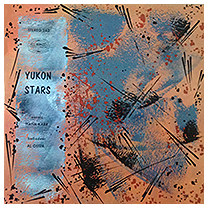 The Yukon Stars "The Yukon Stars" (CBC Radio International, 1967) (LP)
The Yukon Stars "The Yukon Stars" (CBC Radio International, 1967) (LP)
(Produced by Edward Farrant, Gilles Vaudeville & Len Ewert)
On this album, two stars of Canadian country's '60s scene joined together as the "Yukon Stars" to play an October 25 gig at end of the '67 Expo, held in Montreal. Al Oster was a well-established artist, with a couple of hit singles and several CBC radio programs under his belt, while Hank Karr had been playing local shows up in the Yukon for years, though this album really helped him break through into a national solo career. Karr sings on Side One, generally sticking to a jovial set of contemporary-sounding Buck Owens-influenced honky-tonk with a pretty sharp band behind him. The songs are mainly covers, though there is one original, "A Minute Or Three" credited to Karr's real name, Henry Karhut. It's a harrowing and highly detailed account of the cataclysmic earthquake that trashed Anchorage in March, 1964... a nice slice of Northern history there! Sounding quite a bit like Hank Snow on Side Two, Al Oster sticks closely to folk-ish regional pride material, including several Yukon-related songs he wrote, some historical ballads and slightly more questionable material such as Hank Thompson's "Squaws Along The Yukon" which doesn't really hold up that well in our modern-day PC culture. In "Buckets Of Steel," Oster memorializes the last of the big gold-dredging operations, as Canada's gold boom wound to a close after the biggest mills and mines were no longer able to turn a profit. A strong album, showcasing two different strains of deeply authentic Canadian country.
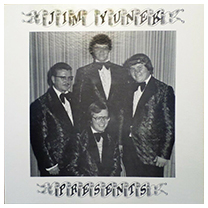 Jim Yunek "Jim Yunek Presents The Jim Yunek Combo" (Unique Records, 1977) (LP)
Jim Yunek "Jim Yunek Presents The Jim Yunek Combo" (Unique Records, 1977) (LP)
(Produced by Dick Lodholz)
A regional band based in Wausau, Wisconsin, with a background in polka and ethnic dance music... Bandleader Jim Yunek was still playing an acoustic accordion when this album came out, though like many polkateers he later adopted an electrified approach. He's joined by band includes Wally Borth on guitar, drummer John Myers, and Jerry Reynolds on saxophone, working through a mostly pop and polka repertoire, playing standards such as "Elmer's Tune," "Harbor Lights" and "Spanish Eyes," though there are also some arguably twangy tunes int he mix, such as Jim Croce's "Bad Leroy Brown" and "Blue Eyes Crying In The Rain," which had been revived by Willie Nelson. There are a couple of songs that might have been originals, but no composer credits to confirm this. It's really Yunek's subsequent album (below) that qualifies these guys as a country act, though like many Great Lakes dance bands, they played what was popular, including a country tune or two.
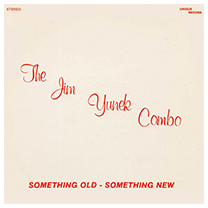 Jim Yunek "Something Old, Something New" (Unique Records, 1979) (LP)
Jim Yunek "Something Old, Something New" (Unique Records, 1979) (LP)
(Produced by Kim Jensen & Jim Yunek)
On this album, Yunek and his band concentrate pretty exclusively on country material, including chestnuts like "Crazy Arms," "Green, Green Grass Of Home" and "You Are My Sunshine" along with newer material such as "Another Somebody Done Somebody Wrong Song," "Never Ending Song Of Love," and Tompall Glaser's infamous male chauvinist anthem, "Put Another Log On The Fire." One song is called out as an original, Wally Borth's "I Just Can't Get Over You," and Borth once again helps anchor the band. The lineup changed a little, but the core members remain: along with Jim Yunek on Baldovox electronic accordion, the group includes Wally Borth (guitar), Tom Wakeen (guitar), Tom Wrysinski (drums and vocals), Jerry Reynolds (saxophone). I'm not sure if they made any other albums, but any info about these folks is certainly welcome.
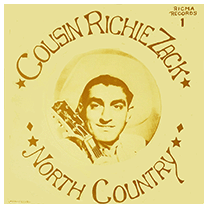 Cousin Richie Zack "North Country" (Ricma Records, 1981) (LP)
Cousin Richie Zack "North Country" (Ricma Records, 1981) (LP)
You'll forgive me for assuming that a country musician named Richie Zack -- "Cousin" Richie Zack, no less! -- would be some kind of unreconstructed uber-hick, hillbilly singer, though at least on this album he was actually a crooning smoothie, along the lines of Hank Locklin or Eddy Arnold. Born Richard Zacharian, "Cousin Richie" was a country singer from Rhode Island who -- along with his brother Eddie Zack -- recorded numerous 78s and singles for major labels and tiny indies alike, and in the early 1950s hosted a nationally syndicated NBC radio show called the Hayloft Jamboree. They started out in the 1930s, and moved through several styles of music -- cowboy songs, hillbilly boogie and honkytonk -- and remained popular regional figures for several decades. I'm guessing that these are later recordings, and that his earlier work was bit rougher around the edges... But I ain't complaining: this is still pretty good! This souvenir album came out in early 1980s... Unfortunately, no info on the musicians backing him, but I guess you can't have everything. Mr. Zack passed away in 2002, at the age of 79.
 Nick Zane "Live In The Smokies" (Zane Records, 19--?) (LP)
Nick Zane "Live In The Smokies" (Zane Records, 19--?) (LP)
(Produced by Zane, Lea & Spears)
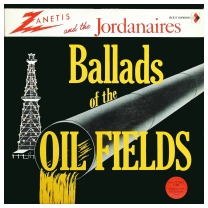 Alex Zanetis "Ballads Of The Oil Fields" (RIK Records, 1964) (LP)
Alex Zanetis "Ballads Of The Oil Fields" (RIK Records, 1964) (LP)
This is an entire album of songs about oil drilling in the American South and the Panhandle, penned by the then-unknown pop-country composer Alex Zanetis, with backing by several A-list Nashville studio pros, including the early-'60s edition of the Jordanaires. Zanetis certainly had a colorful career: he was born in Fond Du Lac, Wisconsin and early in life sang baritone with the Chicago Metropolitan Opera. He abruptly changed gears in 1955 to devote himself to songwriting, eventually moving to Nashville. Mr. Zanetis had remarkable success, with numerous songs recorded by top Nashville stars including Bill Anderson, Brenda Lee, Jim Reeves, and Faron Young -- one of his first hits was "As Long As I Live," a Top Five duet recorded by Red Foley and Kitty Wells back in '55. His song "Snap Your Fingers" was a crossover success, first in the R&B/pop vocals field, later covered by various country artists in the '70s and '80s. Zanetis also was involved in Southern politics, working as a staffer for governors Jimmie Davis, George Wallace and Lamar Alexander. One odd footnote to this already quirky album: a decade later a guy named Sam Thompson would record a song-by-song remake, with one song re-credited to include the '70s-era producer. Go figure. Hmmm... maybe Thompson was actually Mr. Zanetis, re-releasing his own album incognito? Could be! Stranger things have happened.
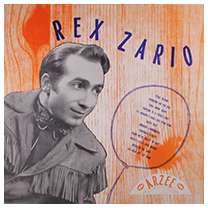 Rex Zario "Rex Zario" (Arzee Records, 1966-?) (LP)
Rex Zario "Rex Zario" (Arzee Records, 1966-?) (LP)
Born in Palermo, Italy, immigrant Philadelphia twangster Rex Zario (1925-1991) recorded a string of obscure hillbilly bop/rockabilly singles in the late 1950s, some of which are gathered on this later LP. According to the album's liner notes, he started his professional career in 1948 on ABC radio's "Hayloft Hoedown" show and later worked on East Coast radio and TV stations WHAT and WTEL. Although the music is good, I think Zario's actual success was pretty minimal -- the liner notes sound pretty noncommittal and puffed-up. Some of his songs such as "You Nearly Lose Your Mind" and "Go Man Go, Get Gone" have popped up on a few modern-day collections of hillbilly twang, and a full reissue of this album would certainly be welcome.
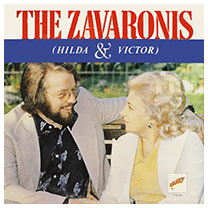 The Zavaronis "(Hilda And Victor)" (Galaxy Records, 197--?) (LP)
The Zavaronis "(Hilda And Victor)" (Galaxy Records, 197--?) (LP)
Country and pop standards from the husband-wife duo of Hilda and Victor Zavaroni, who hailed from the Scottish island of Bute, off the coast near Glasgow. They cover country stuff by folks like Merle Haggard and Buddy Killen, but also pop oldies by Gus Kahn and Albert Von Tilzer, so this isn't exactly an unbridled twangfest. They sure look adorable, though!
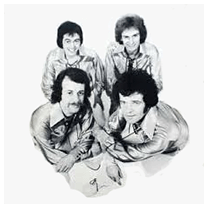 Zebedee "Well Sprung" (Hampshire Sound Service, 1977) (LP)
Zebedee "Well Sprung" (Hampshire Sound Service, 1977) (LP)
Not a lot of info about this English band... The eye-catcher here is a tribute song called "Sorry, Johnny Cash," though they had a pretty diverse repertoire which also included a little bit of Hank Williams ("Jambalaya") and a whole bunch of rock and pop oldies, stuff like "Telstar," "Roll Over Beethoven," "Only Have Eyes For You," and even a cover of Fred Neil's "Everybody's Talkin' At Me." The band included Rick Page (lead guitar), Chris Patterson (bass), Stuart Thomas (keyboards), and Gordon Williams on drums... Sadly, I'm still waiting for my local Record Hut to fulfill the import order I placed back in 1978...
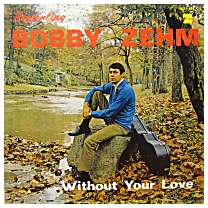 Bobby Zehm "Without Your Love" (Z Records, 1971) (LP)
Bobby Zehm "Without Your Love" (Z Records, 1971) (LP)
(Produced by Johnny Russell & Claude Hill)
A set of all-original material by a singer from Poplar Bluff, Missouri who recorded this album at Chuck Glaser's studio in Nashville. Not sure what the story is behind this one, but this album is packed with original material, most of it written by Zehm, including "I Wouldn't Have You See Me Cryin'," "Think Real Hard," and the delightfully-titled "Blow Me Down A Rat Hole Backwards." There are a couple of other songs also published by Chuck Glaser's publishing company, such Cal Cavendish's "Sitar Pickin'," and "That's The Way The Cookie Crumbles," by Dan Pate. Zehm seems to have been tapped into the old-school Ozark hillbilly scene: on his 7" single of "He Is My Dad" (sadly, not included here) the credits include hillbilly old-timer Zeke Clements(!) as producer... So this Zehm fellow must have know what real twang was all about!
Zeke's Band "Music Time Approved" (Dungeon Records, 197--??) (LP)
(Produced by Tim "Cousin Zeke" Cagle)
Singer Tim Cagle was part of the Branson-based Plummer Family variety show, playing the hillbilly character "Cousin Zeke." In addition to this album, he also recorded with the Plummer Family band, touring regionally throughout the Midwest well up into the 1990s.
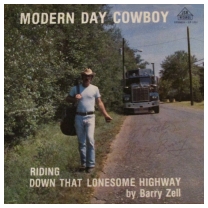 Barry Zell "Modern Day Cowboy" (JSR Records, 1980) (LP)
Barry Zell "Modern Day Cowboy" (JSR Records, 1980) (LP)
(Produced by Tom Elliott)
This fella -- Barry Pagliaroli, aka Barry Zell -- was from Laurence Harbor, New Jersey, although he headed down to Nashville for a while to try and make it in country music. As far as I know, this was his only album, and it's packed with all-original material written by Pagliaroli. The songs include "Modern Day Cowboy," "Why Couldn't I Be The One (Who Wrote Knocking On Heaven's Door)?" and the equally-longwinded "Lady America (Dedicated To The American Hostages In Iran)". The band backing him was all-local, guys from the North Jersey Shore -- guitarist W. J. Grimm (Willy Sage), Ike Williams on bass and J. T. Callahan on drums. They were members of the North Jersey country-rock band, Lakota, which put out an album on the JSR label a year earlier, in '79.
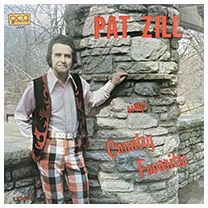 Pat Zill "Sings Country Favorites" (QCA Records, 197--?) (LP)
Pat Zill "Sings Country Favorites" (QCA Records, 197--?) (LP)
Known in his hometown as "the singing bartender," Pat Zill (1925-2015) was the proprietor of the Boat House Lounge, a nautically-themed nightclub situated on the main drag of Whitehall, Ohio, a Columbus suburb which apparently had a swinging scene back in the 1950s and '60s. Zill sang on the radio when he was a kid, but got into boxing in his teens and was competing professionally until World War Two swept him up and landed him in the Marines. He kept prizefighting after the war, but some time in the 'Fifties switched gears and started running a bar outside Columbus, where he sang along to the country tunes on the jukebox. Mr. Zill was recruited by Cincinnati-based talent scout Pat Nelson to cut some tunes over in Nashville, and scored a regional hit with a jaunty little version of "Pick Me Up On Your Way Down." Zill ran the bar for many more years, became a fight promoter and successful boxing coach, and also recorded a few more singles on various labels throughout the '60s and '70s. Zill cut this LP sometime in the 'Seventies, probably under the guidance of Pat Nelson, who joined the QCA label in 1973. As far as I know this was his only full album, other than a CD he cut in 1994 called New Beginnings which featured re-recordings of some of his older stuff. [Thanks to The Columbus Dispatch for their informative posthumous profile of Mr. Zill, which ran in 2020.]
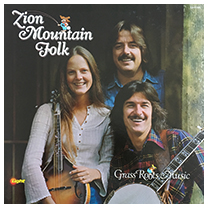 Zion Mountain Folk "Grass Roots Music" (Light Records, 1978) (LP)
Zion Mountain Folk "Grass Roots Music" (Light Records, 1978) (LP)
(Produced by Jack Joseph Puig)
An all-gospel folk-bluegrass set from a longhaired band from the Kona coast of the island of Hawaii. This group featured Steven Smith (guitar), Ruth Smith (mandolin) Harry Browning (banjo), Herb Melton (bass) and Jim Pennington (harmonica), with fiddler Byron Berline sitting in as well. Mahalo!
 Bill Zorn & The Arizona Smoke Revue "Bill Zorn & The Arizona Smoke Revue" (Avada Records, 1980) (LP)
Bill Zorn & The Arizona Smoke Revue "Bill Zorn & The Arizona Smoke Revue" (Avada Records, 1980) (LP)
Banjo picker and guitarist Bill Zorn and his brother Pete were folk scene chameleons who started their own college band in Arizona, The Win'jammers, moving from there into several high-profile groups, notably an early 'Seventies lineup of the New Christy Minstrels, as well as The Kingston Trio, and many years later an oldies-show edition of The Limelighters. In between all that was the Arizona Smoke Revue, an eclectic, rootsy band founded by Bill Zorn that recorded three albums, and which later included his brother Pete. Both of the Zorns also found success in the UK and joined some of the established top bands in the British folk-rock world, Bill Zorn performing with the Albion Band, and Pete Zorn joining both Albion and Steeleye Span, as well as a long stint working with Richard Thompson.
 (Bill Zorn And) The Arizona Smoke Revue "A Thundering On The Horizon" (Rola Records, 1981) (LP)
(Bill Zorn And) The Arizona Smoke Revue "A Thundering On The Horizon" (Rola Records, 1981) (LP)
(Produced by Steve Knightley, Tom Leader, John Verity & Pete Zorn)
On the band's second album, Bill Zorn was joined by brother Pete on bass, along with several British folkies, including Phil Beer (bass, fiddle and guitar), Paul Downes (guitar and mandolin), Dave Mattacks (drums), and guitarist Gene Vogel.
(Bill Zorn And) The Arizona Smoke Revue "New Album" (Rola Records, 1983) (LP)
(Produced by John Acook)
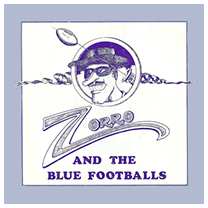 Zorro & The Blue Footballs "Zorro & The Blue Footballs" (Burdett Music, 19--?) (LP)
Zorro & The Blue Footballs "Zorro & The Blue Footballs" (Burdett Music, 19--?) (LP)
(Produced by David Lunsford, Scott Lunsford & Jim Stephens)
A weirdo-eclectic ensemble from Fayetteville, Arkansas who dipped into jazz, rock and roots music. The group formed around 1974 and developed a freewheeling demeanor that earned them a gig opening for Frank Zappa on one of his late 'Seventies tours. Not a "country" record, per se, though they dipped into string-swing territory here with covers of standards such as "Don't Mean A Think (If It Ain't Got That Swing)" and "Ain't Nobody Here But Us Chickens." Besides, they're just nutty and chaotic enough that they should be on our radar. And on their live album (below) they definitely veered hard into a more rural repertoire... The group included lead singer and band co-founder Wendell "Windy" Austin (1952-2010) on clarinet, Ron Brooks (drums), Mike Mohney (saxophone and vocals), Ron Rummage (bass), and Mike Sizemore on guitar. The band played regionally throughout the deep South, including regular forays into Texas and held longterm gigs at a bunch of Arkansas nightspots.
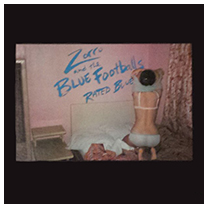 Zorro & The Blue Footballs "Rated Blue" (Chuck Lunch Records, 1983) (LP)
Zorro & The Blue Footballs "Rated Blue" (Chuck Lunch Records, 1983) (LP)
On this mysterious album -- apparently from the early 'Eighties -- the band still takes some cues from Louis Jordan and the like, as on their version of "Caledonia," but there's a pretty decisive swing towards country music, particularly on western swing standards such as "Big Balls In Cowtown," "Stay All Night," and "Take Me Back To Tulsa." Looks like this album was recorded and released just before the group broke up in 1984... not sure what the lineup was like for this show.
Zuni Midnighters "Zuni Midnighters" (Indian Arts Of America, 1965-?) (LP)
A mix of country twang and rock'n'surf oldies from a tribal twang band out of Albuquerque, New Mexico. The Midnighters were one of the longest-running and most professional Native American country bands of the 1960s and '70s, playing regionally and recording several albums. The lineup on this early 'Sixties album (their first?) included Lloyd Boone, Rudy Bowekaty, Lynn Hooee, Kimo Natewa, Stanley Natewa, and Jones Shebola -- not sure who played which instruments, though, alas. This disc has more of a rock orientation, with covers of "Money," "Memphis," "Surf Bunny" and "Wipeout," though they also cover Hank Strzelecki's novelty twang tune "Long Tall Texan," which had been popularized by the Beach Boys. I'm not sure of the exact date on this one, but given the repertoire it was probably recorded no earlier than 1965.
Zuni Midnighters "Land Of The Shalako" (JWP Records, 1973) (LP)
Though still clearly into classic pop and garage rock and 'Sixties R&B -- with covers of "96 Tears," "Midnight Hour," "Pushing Too Hard" and "Whiter Shade Of Pale" -- the Midnighters were also grooving on some hip contemporary roots-rock, including stuff by Creedence Clearwater ("Lodi") and Doug Sahm ("Mendocino"). Not all twang, by any means, but pretty eclectic and groovy, for sure. It's worth noting that this album came out on the JWP label, which also put out an album by Three Faces West, an early band of Austin, Texas icon Ray Wylie Hubbard, so they were definitely in the swing of things. As far as I know, the tribally-themed title track, "Land Of The Shalako," was an original.
Zuni Midnighters "The Long Journey" (JWP Records, 197--?) (LP)
Not sure when this one came out, but it wasn't long after the other JWP albums... According to the liner notes, this was the band's fourth album, and by this time Stanley Natewa was the only remaining original member. There are still some rock'n'soul songs in the mix, but country-oriented material was more in the foreground, as well as more regionally-oriented songs such as "Rancho Tenaya," "Mountains Of New Mexico," and "Long Journey," which was written to commemorate the hardships faced by the Navajo nation.
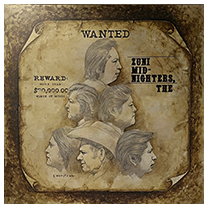 Zuni Midnighters "Wanted" (JWP Records, 1977-?) (LP)
Zuni Midnighters "Wanted" (JWP Records, 1977-?) (LP)
A double LP set(!) with a lot of rock, pop and country oldies, with country stuff including "Lyin' Eyes," "Once A Day," "Rainy Day Woman" and "Wasted Days And Wasted Nights." Not sure when this came out: Discogs describes it as their second album, but the presence of two hit songs from 1975 (by the Eagles and Freddy Fender) suggests that it's later than several of the albums above.
Zuni Midnighters "My Land" (JWP Records, 197-?) (LP)
Zuni Midnighters "Our Sixth Album" (19--?) (LP)
In case anyone was keeping count, this was, well, their sixth album, and possibly the band's last. Stanley Natewa was still holding things down as the groups lead guitar player and main vocalist, with Johnny Natewa on organ, as well Bill Crockett (vocals), Lawrence Laiteyse (drums), Ceam Tekala (bass) and Lebeck Unkistine also on bass.
 Mike & Kathy Yager "Young Love" (197--?) (LP)
Mike & Kathy Yager "Young Love" (197--?) (LP)
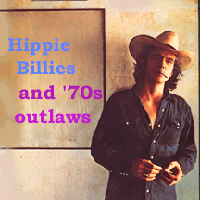 LOCALS ONLY: This is a guide to independent and off-the-radar country musicians from the 1960s, 1970s and early 'Eighties, including hometown performers working in regional oprys, jamborees, dude ranches, casinos, pizza parlors and lounges. They included longhaired country-rockers, red-dirt outlaws, Nashville hopefuls and earnest amateurs, as well as the more country-oriented artists in the bluegrass and southern gospel fields. Many of these musicians toured nationally or regionally while others were strictly hometown folks. These are the people who are often overlooked in the history books but who contributed their talents, hopes and dreams to the country music world, and the aim of this guide is to keep their memories and their work alive. Comments, corrections and suggestions are always welcome.
LOCALS ONLY: This is a guide to independent and off-the-radar country musicians from the 1960s, 1970s and early 'Eighties, including hometown performers working in regional oprys, jamborees, dude ranches, casinos, pizza parlors and lounges. They included longhaired country-rockers, red-dirt outlaws, Nashville hopefuls and earnest amateurs, as well as the more country-oriented artists in the bluegrass and southern gospel fields. Many of these musicians toured nationally or regionally while others were strictly hometown folks. These are the people who are often overlooked in the history books but who contributed their talents, hopes and dreams to the country music world, and the aim of this guide is to keep their memories and their work alive. Comments, corrections and suggestions are always welcome.
 Glenn Yarbrough "Yarbrough Country" (Warner Brothers, 1969) (LP)
Glenn Yarbrough "Yarbrough Country" (Warner Brothers, 1969) (LP)
 Glenn Yarbrough "...The Havenstock River Band" (Impress Records, 1971) (LP)
Glenn Yarbrough "...The Havenstock River Band" (Impress Records, 1971) (LP)
 Bob Yarger "Smoke 'N' Ashes 'N' Promises" (Jester Records, 1976) (LP)
Bob Yarger "Smoke 'N' Ashes 'N' Promises" (Jester Records, 1976) (LP)
 Bobby Yates "S.O.C.M. (Save Our Country Music)" (Rave Records, 1986-?) (LP)
Bobby Yates "S.O.C.M. (Save Our Country Music)" (Rave Records, 1986-?) (LP)
 Bobby Yates "Have You Ever Really Listened (To A Hank Williams Song)?" (Lucky Lady Records, 1989) (LP)
Bobby Yates "Have You Ever Really Listened (To A Hank Williams Song)?" (Lucky Lady Records, 1989) (LP)
 Yellow Hand "Yellow Hand" (Capitol Records, 1970) (LP)
Yellow Hand "Yellow Hand" (Capitol Records, 1970) (LP)
 Butch Yelton & Upbound "Cookin' Country Gospel" (1976-?) (LP)
Butch Yelton & Upbound "Cookin' Country Gospel" (1976-?) (LP)
 Butch Yelton & Upbound "Swing That Gospel Axe" (19--?) (LP)
Butch Yelton & Upbound "Swing That Gospel Axe" (19--?) (LP)
 Roy Lee Yelton "I Love Country Music And You" (Lamon Records, 1983) (LP)
Roy Lee Yelton "I Love Country Music And You" (Lamon Records, 1983) (LP)
 Harvey Yeoman "Mightier Than The Sword" (19--?) (LP)
Harvey Yeoman "Mightier Than The Sword" (19--?) (LP)
 Yogi & Friends "Haywire" (1982-?) (LP)
Yogi & Friends "Haywire" (1982-?) (LP)
 Bill Yohey "Bill Yohey With Twenty Country Strings" (American Heritage Music Corporation, 197--?) (LP)
Bill Yohey "Bill Yohey With Twenty Country Strings" (American Heritage Music Corporation, 197--?) (LP)
 Bill Yohey "The Town And Country Side Of Bill Yohey" (American Heritage Music Corporation, 197--?) (LP)
Bill Yohey "The Town And Country Side Of Bill Yohey" (American Heritage Music Corporation, 197--?) (LP)
 Rusty York "Sings Like Crazy" (Jewel Records, 1968) (LP)
Rusty York "Sings Like Crazy" (Jewel Records, 1968) (LP)
 Young And Restless "Young And Restless" (Woodnote Records, 1981) (LP)
Young And Restless "Young And Restless" (Woodnote Records, 1981) (LP)
 Art Young "Autumn Leaves" (Eagle Records, 1977) (LP)
Art Young "Autumn Leaves" (Eagle Records, 1977) (LP)
 Art Young "I'm Still Your Dear Old Daddy" (Downs Record Company, 19--?) (LP)
Art Young "I'm Still Your Dear Old Daddy" (Downs Record Company, 19--?) (LP)
 Cole Young "Tears In My Little Boy's Eyes" (Younger Records, 1980-?) (LP)
Cole Young "Tears In My Little Boy's Eyes" (Younger Records, 1980-?) (LP)
 Young Country "Young Country" (USR Records, 1975) (LP)
Young Country "Young Country" (USR Records, 1975) (LP)
 Young Country "Barroom Blues" (Lost Records, 1978) (LP)
Young Country "Barroom Blues" (Lost Records, 1978) (LP)
 Jeff Young "Snakey" (AMC Records, 1974) (LP)
Jeff Young "Snakey" (AMC Records, 1974) (LP)
 Neil Young "After The Gold Rush" (Reprise Records, 1970) (LP)
Neil Young "After The Gold Rush" (Reprise Records, 1970) (LP)
 Neil Young "Harvest" (Reprise Records, 1972)
Neil Young "Harvest" (Reprise Records, 1972)
 Neil Young "Sugar Mountain: Live At Canterbury House 1968" (Reprise Records, 2008)
Neil Young "Sugar Mountain: Live At Canterbury House 1968" (Reprise Records, 2008)
 Nelson Young & The Sandy Valley Boys "Pickin' For Pizza" (Eagle Records, 1980) (LP)
Nelson Young & The Sandy Valley Boys "Pickin' For Pizza" (Eagle Records, 1980) (LP)
 Red Young "This Is Red!" (Red Young Enterprises, 1981)
Red Young "This Is Red!" (Red Young Enterprises, 1981)
 Roger Young "...And The Reason Why" (Reason Why Records, 1969) (LP)
Roger Young "...And The Reason Why" (Reason Why Records, 1969) (LP)
 Wally Young "Reunion" (Reunion Records, 19--?) (LP)
Wally Young "Reunion" (Reunion Records, 19--?) (LP)
 Albert Young Eagle "Meet Albert Young Eagle" (Little Richie Records, 1977-?) (LP)
Albert Young Eagle "Meet Albert Young Eagle" (Little Richie Records, 1977-?) (LP)
 Don Youngblood "For The Good Times" (Jewel Records, 19--?) (LP)
Don Youngblood "For The Good Times" (Jewel Records, 19--?) (LP)
 Bill Younger "In Nashville" (Nugget Records, 19--?) (LP)
Bill Younger "In Nashville" (Nugget Records, 19--?) (LP)
 The Younger Brothers Band "Back Porch Singin' " (Fantastik Records, 1981) (LP)
The Younger Brothers Band "Back Porch Singin' " (Fantastik Records, 1981) (LP)
 Yukon Railroad Co. "Yukon Railroad Co." (Big Hole Records, 1975) (LP)
Yukon Railroad Co. "Yukon Railroad Co." (Big Hole Records, 1975) (LP)
 The Yukon Stars "The Yukon Stars" (CBC Radio International, 1967) (LP)
The Yukon Stars "The Yukon Stars" (CBC Radio International, 1967) (LP)
 Jim Yunek "Jim Yunek Presents The Jim Yunek Combo" (Unique Records, 1977) (LP)
Jim Yunek "Jim Yunek Presents The Jim Yunek Combo" (Unique Records, 1977) (LP)
 Jim Yunek "Something Old, Something New" (Unique Records, 1979) (LP)
Jim Yunek "Something Old, Something New" (Unique Records, 1979) (LP)
 Cousin Richie Zack "North Country" (Ricma Records, 1981) (LP)
Cousin Richie Zack "North Country" (Ricma Records, 1981) (LP)
 Alex Zanetis "Ballads Of The Oil Fields" (RIK Records, 1964) (LP)
Alex Zanetis "Ballads Of The Oil Fields" (RIK Records, 1964) (LP)
 Rex Zario "Rex Zario" (Arzee Records, 1966-?) (LP)
Rex Zario "Rex Zario" (Arzee Records, 1966-?) (LP)
 The Zavaronis "(Hilda And Victor)" (Galaxy Records, 197--?) (LP)
The Zavaronis "(Hilda And Victor)" (Galaxy Records, 197--?) (LP)
 Zebedee "Well Sprung" (Hampshire Sound Service, 1977) (LP)
Zebedee "Well Sprung" (Hampshire Sound Service, 1977) (LP)
 Bobby Zehm "Without Your Love" (Z Records, 1971) (LP)
Bobby Zehm "Without Your Love" (Z Records, 1971) (LP)
 Barry Zell "Modern Day Cowboy" (JSR Records, 1980) (LP)
Barry Zell "Modern Day Cowboy" (JSR Records, 1980) (LP)
 Pat Zill "Sings Country Favorites" (QCA Records, 197--?) (LP)
Pat Zill "Sings Country Favorites" (QCA Records, 197--?) (LP)
 Zion Mountain Folk "Grass Roots Music" (Light Records, 1978) (LP)
Zion Mountain Folk "Grass Roots Music" (Light Records, 1978) (LP)
 Zorro & The Blue Footballs "Zorro & The Blue Footballs" (Burdett Music, 19--?) (LP)
Zorro & The Blue Footballs "Zorro & The Blue Footballs" (Burdett Music, 19--?) (LP)
 Zorro & The Blue Footballs "Rated Blue" (Chuck Lunch Records, 1983) (LP)
Zorro & The Blue Footballs "Rated Blue" (Chuck Lunch Records, 1983) (LP)
 Zuni Midnighters "Wanted" (JWP Records, 1977-?) (LP)
Zuni Midnighters "Wanted" (JWP Records, 1977-?) (LP)


